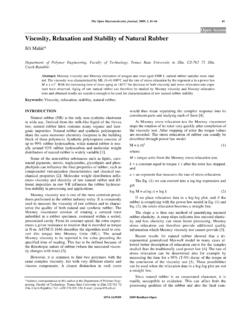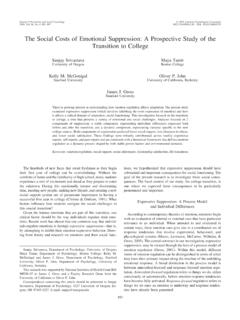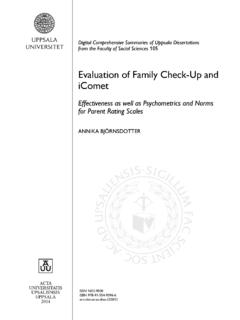Transcription of Measuring Volitional Competences: Psychometric Properties ...
1 66 The Open Psychology Journal, 2008, 1, 66-77 1874-3501/08 2008 Bentham Open Open Access Measuring Volitional Competences: Psychometric Properties of a Short Form of the Volitional Components questionnaire (VCQ) in a Clinical Sample Simon Forstmeier1,* and Heinz R ddel2 1 Department of Psychology, Division of Psychopathology and Clinical Intervention, University of Zurich, Switzerland and 2 Psychosomatic Hospital St.
2 Franziska-Stift, Bad Kreuznach, Germany Abstract: Volitional competences (skills of will), including self-regulation skills such as self-motivation and emotion regulation and self-control skills such as impulse control, are particularly necessary for patients with psychiatric and psy-chosomatic disorders. The Volitional Components questionnaire (VCQ) is an instrument designed to measure Volitional competences. However, its length of 190 items prevents its routine application in clinical settings. This study evaluates a new 36-item short form of the VCQ. 1018 inpatients of a psychosomatic rehabilitation clinic completed the VCQ and sev-eral measures of psychopathology, personality, and cognitive ability.
3 Exploratory factor analysis identified six factors. Confirmatory factor analysis showed that the VCQ-36 shared several Volitional components with the original VCQ. Most of the self-regulation competences correlated negatively with psychopathological measures such as depression, as well as with neuroticism, social inhibitedness, and excitability, and positively with extraversion. Impulse control was also nega-tively associated with neuroticism and excitability. No meaningful correlation with cognitive ability was observed. The VCQ-36 is a reliable and valid instrument for assessing Volitional competences and is well suited for routine application in clinical settings.
4 INTRODUCTION The basic constituent in most approaches to volition is the human capacity to regulate other psychological functions such as emotion, motivation, and cognition in order to reach challenging goals that require some sort of Volitional regula-tion. Several theories of volition have been proposed, with labels such as willpower [1], ego strength [2], action orienta-tion [3, 4], self-regulation [5-10], self-control [7, 8, 11], and volition [12-14]. Some theoretical conceptions focus on single Volitional competences without directly referring to volition as the su-perordinate concept ( , motivation regulation [15, 16], emotion regulation [17-21], and attention regulation [22, 23]).
5 In his theory of self-regulation, Kuhl [7, 8] offers a comprehensive approach to the variety of Volitional compe-tences that are utilized by an individual to regulate other psychological functions. This theory forms the Volitional part of a broader theory of Volitional action regulation [9, 14]. Volition, or the will, is conceptualised as the central control instance which coordinates mental processes and subsystems in a way that the implementation of intentions is optimized. The most important mental subsystems that have to be coor-dinated according to an intention are attention, motivation, emotion, activation, cognition, and behaviour.
6 Volition is *Address correspondence to this author at the Department of Psychology, Division of Psychopathology and Clinical Intervention, University of Zu-rich, Binzmuehlestr. 14/17, 8050 Zurich, Switzerland; Tel: ++41 (0)44 635 73 05; Fax: ++41 (0)44 635 73 19; E-mail: differentiated into several Volitional competences, which can be described as either consciously deployable strategies or unconsciously represented mechanisms. The Volitional competences are grouped into two basic modes of volition: self-regulation and self-control. Kuhl [7, 8, 27] conceptualizes self-control as the self-disciplining mode of volition.
7 Subsystems such as motivation or emotion that are at variance with the active intention are inhibited. Self-control comprises goal recollection, forgetfulness pre-vention, planning skill, impulse control, and initiating con-trol. Self-regulation is conceptualized as the self-integrating mode of volition. Subsystems interact and are modified in order to unite as many subsystems as possible behind an in-tention. Self-regulation comprises attentional focusing, self-motivation, emotion regulation , self-activation, self-relaxa- tion, decision regulation, and coping with failure. Although theories of volition have mainly been devel-oped in the field of basic psychology, they have been exten-sively applied in clinical, health, educational, and organiza-tional psychology.
8 Volitional competence promotes recovery from stress [24] and correlates with positive attitudes ( , self-confidence, optimism) and with fewer reports of anxiety and depression [6, 11, 25]. Deficits in Volitional competence are associated with various psychiatric disorders [26-28] and are probably a vulnerability factor for anxiety disorders [29] and depression [30]. Self-regulation is also associated with better social relationships and interpersonal skills [11, 31]. Volitional competences predict studying behaviour [32], higher school grades [11], and enactment of transfer inten-tions in management training [33].
9 Measuring Volitional Competences The Open Psychology Journal, 2008, Volume 1 67 Measures of Volition Several measures of volition have been proposed, includ-ing the Action Control Scale (ACS) [34], the Locomotion and Assessment questionnaire (LAQ) [6], the Self-Control Scale (SCS) [11], the Self-Regulation Scale (SRS) [25], and the emotion regulation questionnaire (ERQ) [17]. How-ever, only the Volitional Components questionnaire (VCQ) by Kuhl [27] measures the variety of Volitional competences conceptualized in the theory of self-regulation [7, 8]. The VCQ is available as a long (VCQ-L) and short form (VCQ-S) [35].
10 The VCQ-L consists of 38 scales (5 items per scale) making up four sections. Fourteen scales measure the voli-tional competences that constitute the two modes of volition (nine self-regulation and five self-control scales). Thirteen scales assess symptoms of reduced access to these Volitional competences under conditions of frustration or stress ( state orientation ). Two scales measure Volitional and general self-confidence. Finally, nine scales assess symptoms of spontaneous control without Volitional activity ( volition avoidance ). The test person rates the extent to which each item applies to him-/herself on a 4-point Likert scale (0 = not applicable, 3 = wholly applicable).



















